EU can’t override Hungary’s veto on Ukraine
– German state media
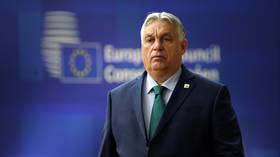
The EU leadership has yet to devise a way to overcome Hungary’s veto, which has blocked the start of accession talks with Ukraine, DW has reported, citing anonymous sources.
Unlike most other EU member states, Hungary has consistently refused to provide weapons to Ukraine and repeatedly criticized the bloc’s sanctions against Russia. Budapest has also staunchly opposed the prospect of Kiev joining the EU.
In a piece on Friday, DW quoted an unnamed source as acknowledging that “currently, there are no ways to overcome Hungary’s veto.” Another source concurred that the “situation is complicated,” with Brussels’ attempts to “explore legal ways to bypass Hungary’s veto” having proved fruitless.
According to the publication, Brussels is counting on Hungarian Prime Minister Viktor Orban’s Fidesz party losing power in the parliamentary election scheduled for April 2026.
Rest assured that Brussels will do everything in its power to ensure that happens. If they can't assassinate Orban politically, don't be surprised if they do it physically.
For the time being, the EU leadership intends to complete all technical work “in advance, so that when Orban leaves we are ready to move quickly forward” on Ukraine accession talks, DW quoted its source as saying.
Astonishing!
Delivering her annual State of the Union address to the European Parliament earlier this month, European Commission President Ursula von der Leyen said that it was time to “break free from the shackles of unanimity” and move towards qualified majority voting in some areas of foreign policy.
Last month, Hungarian Foreign Minister Peter Szijjarto claimed that Brussels was conspiring to overthrow the “patriot Slovak, Hungarian, and Serbian governments” and replace them with puppet regimes.
Around the same time, Russia’s Foreign Intelligence Service (SVR) made similar allegations.
Also in August, Szijjarto warned that Ukraine’s potential accession to the bloc “would be the coup de grace to the European Union,” as it would have to redirect “practically all” of its financial resources towards supporting Kiev. Moreover, “much lower-quality agricultural products would destroy European agriculture,” the Hungarian diplomat stated, echoing concerns previously aired by Orban.
In June, Hungary vetoed a joint EU statement on Ukraine, effectively blocking Kiev’s accession talks, since unanimous approval was required.
===============================================================================================
Orban reveals what he told Trump about Russian oil
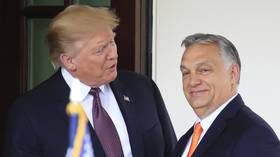
Hungarian Prime Minister Viktor Orban told US President Donald Trump in a recent phone call that his country’s economy would plummet almost instantly if it stopped receiving Russian oil and gas.
Budapest continues to resist mounting pressure from Brussels and Washington to end its reliance on Russian energy, citing geographic and infrastructural constraints as well as national security interests.
“If Hungary is cut off from Russian oil and natural gas, immediately, within a minute, Hungarian economic performance will drop by 4%,” Orban said in his regular interview on Friday. “It means the Hungarian economy would be on its knees.”
Asked whether Trump accepted his arguments during their phone call on Thursday, Orban replied: “America has its arguments and interests, Hungary has its own. Our task is to express and represent them clearly. If we are friends, we listen to each other – and then everyone does what they think is right.”
Trump appeared to acknowledge Orban’s concerns, describing him as a “great guy” and a “great friend of mine.”
“Hungary, you know, they’re landlocked. And they don’t have a nice ocean where ships can sail in from all over the world. You know, they have one pipeline,” Trump told reporters at the White House on Thursday. He was referring to the Druzhba (Friendship) oil pipeline, which has recently been targeted by Ukraine, disrupting supplies to Hungary and Slovakia.
“And Slovakia, too. They’re sort of married to one pipeline. So I just don’t want to have people go blaming them,” Trump added.
Hungarian Foreign Minister Peter Szijjarto reaffirmed that Budapest would not abandon its “national interests” under external pressure, following a meeting with his Russian counterpart Sergey Lavrov just hours after the Orban-Trump call.
Szijjarto also blasted Brussels for failing to defend member states’ energy security in the wake of the Druzhba attacks. “Instead of protecting our energy security, they gave us lectures. And you know, this is a scandal, I think,” he said.
Two-thirds of Germans dissatisfied with Merz – poll
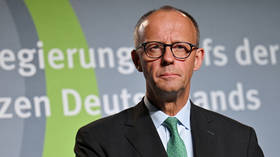
German Chancellor Friedrich Merz’s approval rating has hit its lowest point and continues to slide, according to a new poll released Saturday.
Nearly two out of three Germans are now dissatisfied with their chancellor, up 20 points from 45% in early June, according to an INSA survey. Meanwhile, the proportion expressing satisfaction with the chancellor has fallen from 36% to just 23%.
At the same time, Alternative for Germany (AfD) continues to outpace the ruling coalition between the center-right CDU/CSU and the Social Democrats, the poll suggests. The bloc remains stagnant at 25%, while the right-wing opposition party holds firm at 26%, making it the strongest political force in the country.
The poll also shows Chancellor Merz’s coalition partners struggling, with the Social Democrats, Greens, and The Left all lagging in support. Smaller parties such as the Free Democrats and Sahra Wagenknecht’s BSW remain below the threshold needed to enter parliament.
Merz, who took office in May, has pledged to revive Germany’s sluggish economy, strengthen the military, and secure continued support for Ukraine – while also pushing for sweeping cuts to the welfare system.
However, a recent study by the insurer R+V Versicherung suggested that his campaign promises are increasingly out of step with public concerns. Germans cited the rising cost of living, immigrant and refugee-related issues, high taxes, and potential cuts in social benefits as their top worries.
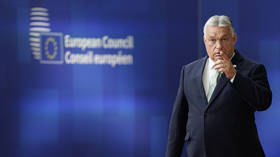
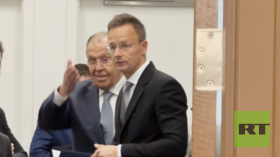
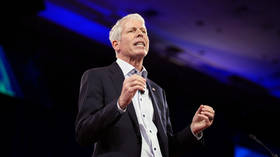


No comments:
Post a Comment